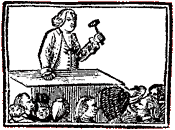“He hath been discovered selling said Tea”
 On Monday, 3 Jan 1774, as I quoted yesterday, the Boston Gazette reported on men confiscating a supply of tea from a poor Dorchester man named Ebenezer Withington.
On Monday, 3 Jan 1774, as I quoted yesterday, the Boston Gazette reported on men confiscating a supply of tea from a poor Dorchester man named Ebenezer Withington.
The same day, Dorchester had a town meeting about the matter. The community might have thought that would resolve everything.
But on Thursday, 6 January, the Boston News-Letter and Massachusetts Spy repeated the Gazette story. The next day, it appears, Dorchester’s clerk copied out the proceedings of the town meeting and sent them to Spy printer Isaiah Thomas.
It took a week for Thomas to put out his next issue. The proceedings appeared on 13 January, but with a 7 January dateline; with a decorative first initial, but without any introductory explanation.
At a Meeting of the Freeholders and other Inhabitants of the Town of DORCHESTER, January 3d, 1774, by Adjournment from December 28th, 1773.And that publicly put to rest the issue of the half-chest of tea that had floated away from the Boston Tea Party and ended up on Dorchester. The town got to present itself as committed to the tea boycott for all the right reasons. Withington got to declare he meant no harm. As for the people who had bought tea from Withington, they could keep their names quiet by giving up their stashes.
EBENEZER WITHINGTON of this Town, Labourer, personally appeared and acknowledged in this Meeting and subscribed the following with his own Hand:
“I found said Tea on Saturday, on going round upon the Marshes; brought off the same thinking no Harm; returning I met some Gentlemen belonging to the Castle, who asked me if I had been picking up the Ruins? I asked them if there was any Harm? they said no except from my Neighbours.—Accordingly, I brought Home the same, part of which I disposed of, and the Remainder took from me since.
EBENEZER WITHINGTON”.
RESOLVED, That his Conduct therein proceeded from inadvertency, and it gives the greatest Satisfaction to this Town that he hath been discovered selling said Tea, otherwise the Conspirators against our Rights and Liberties might have taken Occasion to have insinuated, as their Manner is, that the whole of the Tea said to have been destroyed was plundered and privately sold contrary to the most notorious Facts:
And whereas the said Ebenezer Withington hath declared that he hath sold a Part of the Tea which he had taken up as before said to divers Persons,
RESOLVED, That the said Persons be and are hereby desired to deliver to the Committee of Correspondence for this Town the Tea thus purchased by them of the said Withington, to the intent that the same may be totally destroyed; and if said Persons or either of them shall refuse so to do, they shall be deemed as Enemies who have joined with the Ten Consignees and other Conspirators, to promote the use of the detested Article, and their Names shall be publicly posted accordingly, . . .
RESOLVED, That this Town, will by all Means in their Power, discountenance the use of Tea, while it is subject to a Duty, imposed on it by the British Parliament for the Purpose of raising a Revenue in America without our Consent, . . .
RESOLVED, That this Town on the most mature Deliberation highly approve of the Proceedings of the People who assembled in the Old South Meeting House in Boston on the 29th of November last and since. . . . it is the Opinion of this Town that the Destruction of the Tea proceeded entirely from the Obstinacy of the Consignees, and the Collector of the Customs [Richard Harrison] in refusing to grant a Clearance, and of the Governor [Thomas Hutchinson] in refusing to grant a Pass for Mr. [Francis] Rotch’s Ship.
A true Copy from Dorchester Records.
Attest. NOAH CLAP, Town-Clerk.
So does Ebenezer Withington’s story prove that people really did collect detritus of the Tea Party on the morning after the event, as much lore claims? Actually not.
TOMORROW: Reading the details.

No comments:
Post a Comment